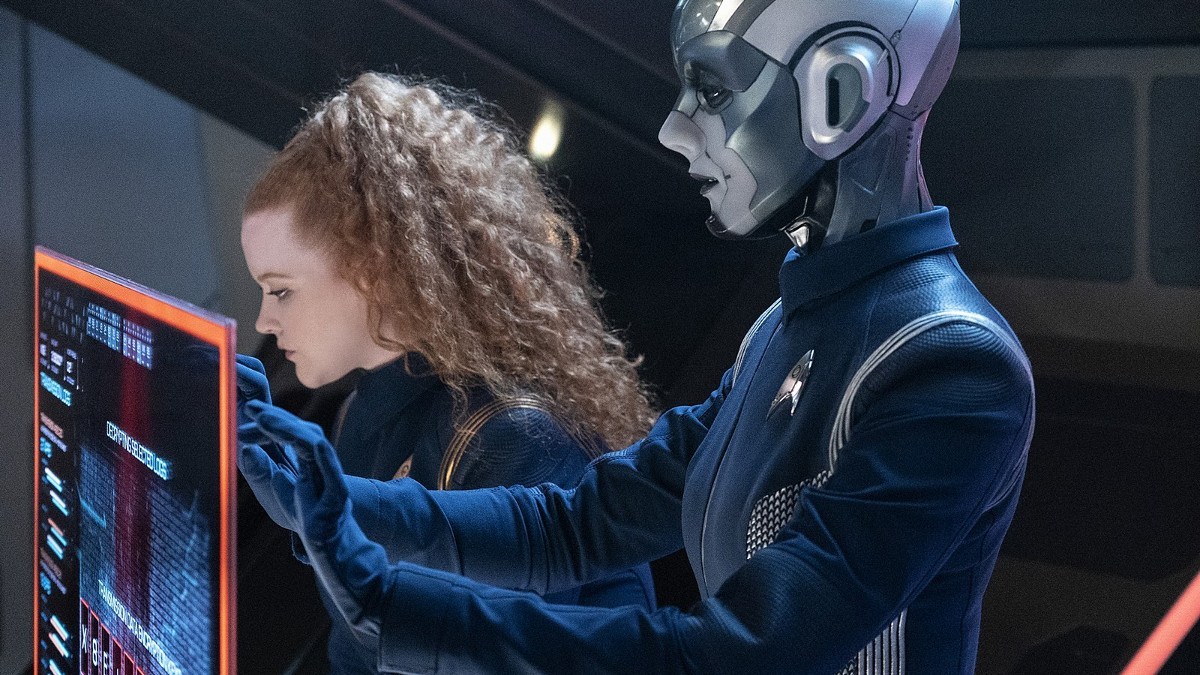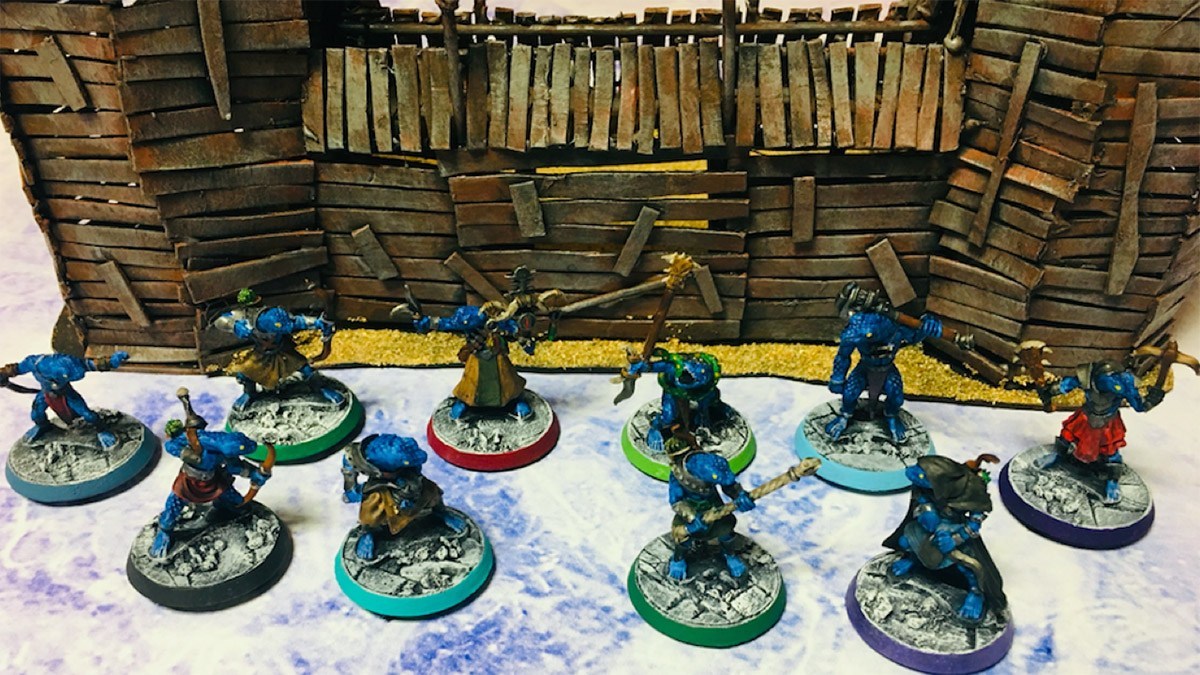Welcome to another week where we recap, react to, and ruminate about Star Trek: Discovery. Star Trek: Discovery Season 2 Episode 9 took us through several story threads, yet again and we say goodbye.
This post will mostly contain minor spoilers but there is one pretty big spoiler. So, don’t read ahead until you have watched Episode 9.
As with previous posts in this Star Trek: Discovery series, there won’t be a lengthy recap, but instead of we will focus on the basics of what we learn. Once again, I’ll be pulling reactions and ruminations from my Star Trek community.
Star Trek: Discovery Season 2 Episode 9: “Project Daedalus” Recap
In Star Trek: Discovery Season 2 Episode 9 – “Project Daedalus,” the Discovery is tasked by Admiral Cornwell to infiltrate Section 31 headquarters and take down Control.
Cornwell subjects Spock to a deception detector test. Spock passes. However, the results completely contradict recorded footage of Spock murdering people.
Burnham is trying to help Spock, but he resists. Eventually, they get into a verbal argument. This leaves Burnham in tears when he points out that she never faces the pain of events. Instead, she decides to place all burdens upon herself.
Spock dishes more of his wisdom on Stamets when he tells Stamets why Culber is having difficulties.
We learn that Airium has a lot of cybernetic implants as the result of an accident. Once a week, she must go into an alcove-type thing to purge unwanted memories and decide which memories she wants to keep. Her memory storage is rather limited. We also learn that Airium and Tilly have a very close friendship.
There is a great exchange between Cornwell and Pike about Federation ideals after Pike learns the real reason the Enterprise was deployed elsewhere during the war.
The thing that is controlling Airium is Control, and she’s sabotaging a lot of things. Control has also killed a bunch of admirals and replaced them with holograms. The footage of Spock also contained a hologram. Control is bad. Airium becomes aware of what is happening to her and tries her best to make sure Tilly doesn’t let her do anything horrible. But that fails.
At the end, we say an emotional goodbye to Airium.
Star Trek: Discovery Season 2 Episode 9: “Project Daedalus” Reactions
My Star Trek community is still moving to its new home, but we did manage to have a bit of a conversation this week. Here are some of the things that were said about “Project Daedalus:”
G.H. Brothers: My initial reaction throughout tonight’s episode was that there was a LOOOOOOOOOT going on. To an almost detrimental extent. You can’t juggle all those plot lines at once without making a bit of a mess. Then. The end came. And the absolute silence, except for the waves, during the credits. 1:04-1:10 of this clip is the absolute first thing that went through my head.
Me to G.H.: Yeah, that’s the problem with only having 14 episodes per season: They have to fit in a lot of things in just over half the episodes of a full-length season and it can be too much for one episode.
Despite that, I enjoyed this episode. I really enjoyed Spock’s lecture to Burnham about instead of dealing with the emotions of what happened to her as a child, she places all burdens upon herself. That is also something very indicative of complex post traumatic stress.
The other thing that caught my brain was that Control and Airium fit into a theory proposed last week that Airium is a precursor to the Borg. Control was described with the same characteristics as the Borg Queen. Who knows where Airium ends up and with her cybernetic implants and if she is actually dead? She may end up in the Delta quadrant. The Borg also has the same end-game as what the Red Angel shows Spock: To get rid of all sentient life. The Borg doesn’t qualify as sentient because of its collective consciousnesses.
But if she and Control are the beginnings of the Borg, then we know the Red Angel isn’t successful because of events in TNG and on.
G.H.: So interesting that you mention the Borg, because that’s ALL I could think about with the probe a week or two ago. And all this talk of learning every possible strategy in order to conquer sounds a hell of a lot like their adaptive capabilities also. Plus, the time travel bit (ST:FC), the fact that they come from the far-flung reaches of the Delta quadrant, so teleportation (or using a transwarp conduit that makes it LOOK like teleportation) would be useful… hadn’t really considered any of this before now.
Me: So I decided to Google Project Daedalus. It was a real thing.
The bit that got me was that it was supposed to be self-replicating. What if this is another thing like V’Ger? What if in Star Trek the variant Project Daedalus actually happened:
A quantitative engineering analysis of a self-replicating variation on Project Daedalus was published in 1980 by Robert Freitas.[8] The non-replicating design was modified to include all subsystems necessary for self-replication. Use the probe to deliver a seed factory, with a mass of about 443 metric tons, to a distant site. Have the seed factory replicate many copies of itself on-site, to increase its total manufacturing capacity, then use the resulting automated industrial complex to construct probes, with a seed factory on board, over a 1,000-year period. Each REPRO would weigh over 10 million tons due to the extra fuel needed to decelerate from 12% of lightspeed.
And Section 31 found this evolved self-replicating project after Earth lost track of it after WWIII (when Earth lost track of a lot of interstellar stuff), they decided to play with the tech, and the Borg eventually becomes the result?
[More talk about the Borg theory.]
Ani Hatzis: The end of Episode 9 came like a punch, and I was emotionally touched like I have only been by Star Trek when I watched the final episode of DS9 and even more so the final episode of Voyager (the scene with Janeway and Tuvok made me cry).
I believe the effect would have been even more intense if Discovery seasons would have more episodes. Imagine they could spend more time on personal stories of bridge officers like Airium. It’s better than in the first season though.
There was a dialog between Spock and Stamets, where Stamets asked what made Spock so special that the Red Angel has chosen him. And it makes me believe that future Burnham could be the angel.
Oh, and I have also realized something else, finally. Burnham reminds me of my best friend I had during elementary school. She was in the same way extremely smart, tough, and assertive, always had the best grades.
[More talk about the Burnham theory.]
Me: Another thing I forgot to mention, Captain Pike is quickly becoming my favorite captain and it’s going to suck when he’s back on the Enterprise. There was that line from Cornwell about how Pike represents everything that is good about the Federation after he figured out the real reason the Enterprise was deployed elsewhere during the war. The objection he raised had me yell, “PREACH!”
Star Trek: Discovery Season 2 Episode 9: “Project Daedalus” Ruminations
There were so many threads and different emotions in Star Trek: Discovery Season 2 Episode 9 that I’m having a difficult time grasping onto one about which to ruminate.
There was more talk about faith, but this was about having faith in yourself and your abilities. Burnham’s complex childhood trauma was touched on again. There was more exploration of memories, which is a continuation from Episode 8 of Season 2. There was Pike’s objection, which represented everything I did not like about DS9. The wisdom Spock served about Culber was on point. There was a bit of a “the needs of the many” scene at the end.
And, of course, a lot more was introduced that caused theories to fly about who is the Red Angel and what is their purpose.
With only five episodes left, I am excited for more emotional journeys but hopefully not so many crammed into one episode.
This week, I think I’m just going to end things with the following thoughts:
Faith takes on many forms and having it is difficult. Even if you’ve never been given a reason to not have faith. Trauma and how people experience and move through post traumatic stress is complex even if it isn’t the complex form as the result of prolonged childhood trauma. Relationships are complicated and can be especially so with those you love the most and with whom you are most intimate.
So far Season 2 of Star Trek: Discovery can be summed up as: A show that properly mirrors the complexity of life, love in all its forms, relationships in all their forms, and trauma. It isn’t pretty but it is rewarding.
As an end note, my Star Trek community is in the process of moving with the upcoming shutdown of Google+. You can find us and join us at The United Federation of Planets. It’s free to join but there are paid options with extra features to help offset the costs of hosting and building the apps. The Android app is now available and so is the iOS app.
Until next Sunday, Live Long and Prosper!




